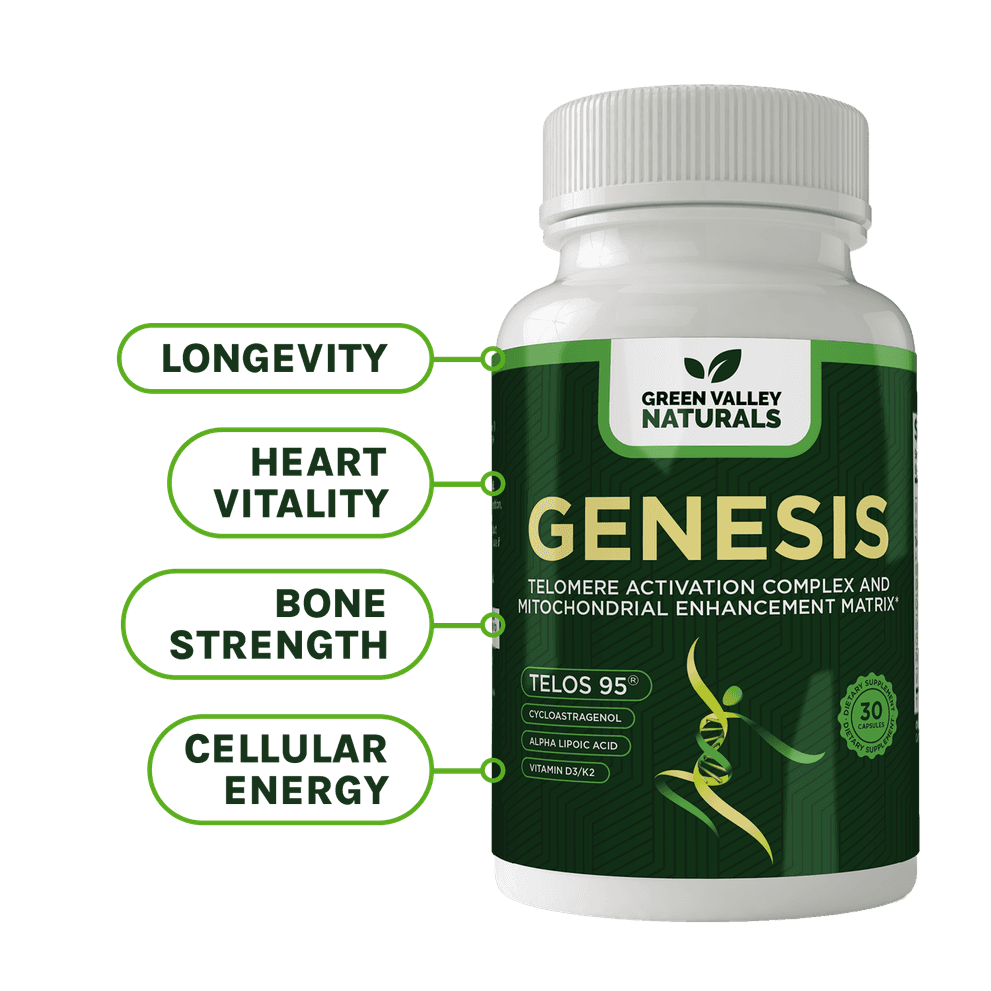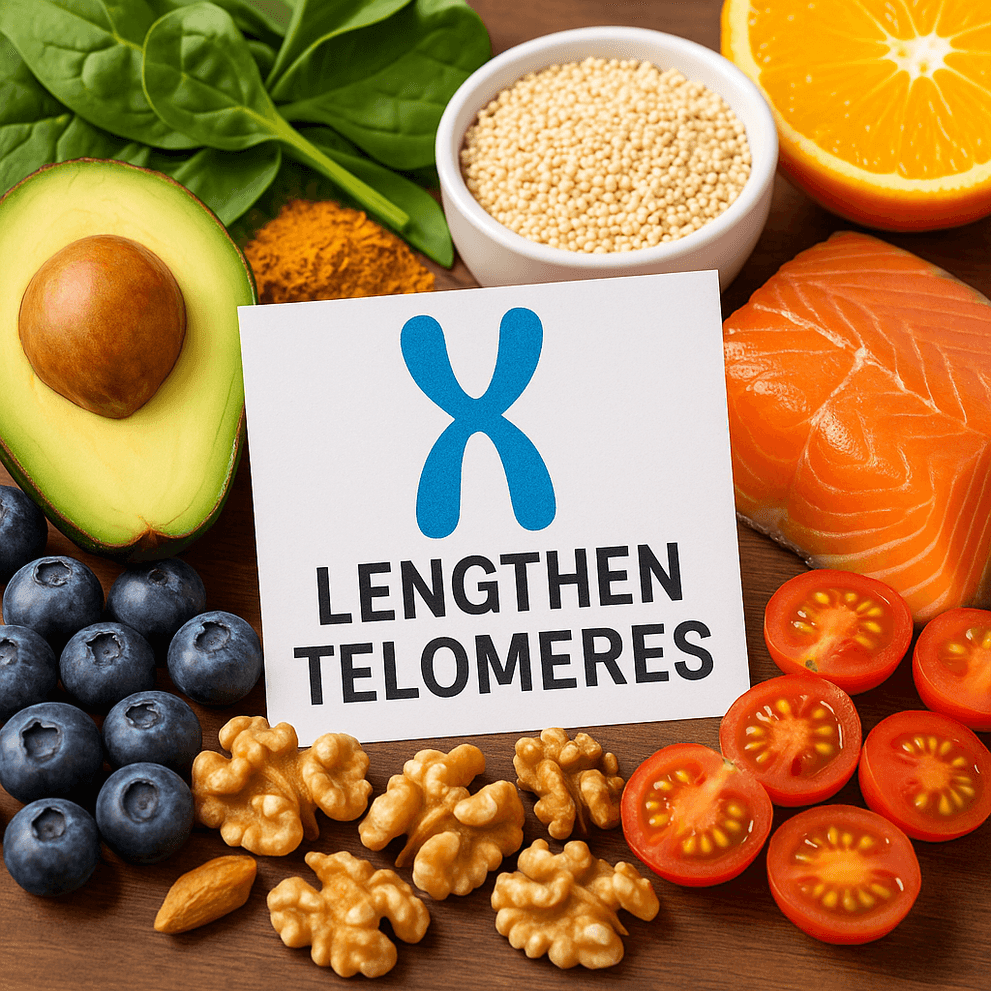
What if the secret to a longer, healthier life was already sitting on your plate? Emerging research shows that certain everyday foods can slow aging at the cellular level by protecting tiny DNA caps called telomeres. These microscopic guardians hold the key to youth, resilience, and disease resistance—and the choices you make in your kitchen may shape how gracefully you age. Curious which foods have this age-defying power? Keep reading...
Key Takeaways
Telomeres Are Key to Aging: Telomeres protect your DNA, and their shortening is linked to aging and chronic diseases.
Food Matters: A diet rich in fruits, vegetables, omega-3s, and antioxidants supports longer telomeres and better health.
Avoid the Inflammaging Trap: Ultra-processed foods accelerate telomere damage and aging through chronic inflammation and oxidative stress.
The DNA Secret to Longevity—And the Foods That Unlock It
Telomeres are protective DNA-protein structures found at the ends of chromosomes, often compared to the plastic tips on shoelaces that prevent fraying. These specialized sequences consist of repetitive DNA (TTAGGG in humans) that don't code for any proteins but serve a crucial protective function. Each time a cell divides, telomeres naturally shorten because DNA replication machinery cannot fully copy the very ends of chromosomes—a phenomenon known as the "end replication problem." This shortening acts as a molecular clock, limiting how many times a cell can divide before entering senescence (a state where it stops dividing) or dying. While an enzyme called telomerase can add DNA back to telomeres, it's only highly active in stem cells, germ cells, and unfortunately, most cancer cells.
Telomere length has emerged as a critical biomarker of cellular aging and overall health, with shorter telomeres associated with an increased risk of age-related diseases, including cardiovascular disease, diabetes, Alzheimer's disease, and certain types of cancer. When telomeres become critically short, chromosomes can become unstable, leading to cellular dysfunction, inflammation, and tissue deterioration that characterizes the aging process.
Lifestyle factors significantly impact telomere length. Chronic stress, a poor diet, a lack of exercise, and smoking accelerate telomere shortening, whereas regular physical activity, effective stress management, a healthy diet, and adequate sleep help preserve telomere length.
This discovery has revolutionized our understanding of aging, suggesting that while we can't stop the biological clock entirely, we may be able to slow it down through healthy lifestyle choices, potentially extending both lifespan and healthspan.
That's important! Healthy aging and longer life depend on that genetic material in your cells functioning properly. So if you can help your telomeres stay longer, your odds for a longer, healthier life improve immensely.1
Why Telomere Health Starts on Your Plate
Eating the right foods and following the correct dietary patterns can provide a powerful boost to telomeres and lead to healthy aging. When your meals focus on high-fiber fruits and vegetables that help fight inflammation, every forkful helps your telomeres stay longer and lowers the risk of chronic disease.
Indulging in the typical ultra-processed foods that most Americans can't resist may snip off pieces of your telomeres, weakening your anti-aging defenses and leading to an increase in those senescent zombie cells that can trip up healthy aging.
Inflammaging: The Link to Shorter Telomeres
Unfortunately, most of us, as we age, experience what is known as inflammaging, an increase in harmful inflammation that can lead to a long list of chronic diseases, and which also affects telomere length and accelerates telomere shortening.
According to researchers at the National Institute on Aging, a range of changes in the aging body can trigger inflammaging. For instance, your aging immune system, just like an aging athlete, can't perform the way it used to, and damaged immune cells become "dysregulated". Instead of carrying out its disease-fighting tasks and destroying infectious organisms, your immune system boosts inflammation and vandalizes your own organs.
Along with that, oxidative stress in the body, insulin resistance, and weight gain, along with caustic substances (free radicals) released because of mitochondrial dysfunction (mitochondria are the organelles in cells that produce energy) can all add to inflammaging. 2
Oxidative stress and inflammation often go hand in hand in causing inflammaging and shorter telomeres. Oxidative stress occurs when overly large amounts of molecules accumulate in the body that are "oxidative reactive species" (another name for those nasty free radicals). These reactive molecules oxidize cell membranes and other structures. You can think of this damage to cells as similar to what happens when an old nail is soaked in water and starts to rust, it oxidizes and deteriorates.3
Antioxidant nutrients can offset this process and reduce oxidative stress and inflammation. Meals that contain foods rich in antioxidants are key to forming an anti-inflammatory diet and kickstarting telomerase activity.
Anti-Inflammatory Food Lengthens Telomeres
A lot of anti-aging research has now focused on how eating anti-inflammatory foods is associated with longer telomere length, can boost your telomerase activity and potentially lower the risk of many illnesses. Plus, it's hoped that spreading the word about anti-inflammatory dietary patterns may improve our overall national health and help slow biological aging among greater numbers of people.
One important study, performed at the University of Michigan, shows that a diet centered on fruits and vegetables along with whole grains with a low intake of added sugar, sodium and processed foods -- especially processed meats -- may help slow the aging process and protect telomeres. In determining these factors, the researchers gave a nutrition examination survey to 5,000 people while also taking into account their lifestyle choices.
Their statistical analysis demonstrated that dietary patterns like the Mediterranean diet, and the DASH diet, which both stress eating plenty of fruits and vegetables along with whole grains and plant based proteins, apparently help keep telomeres longer.4
The DASH diet is the "Dietary Approach to Stop Hypertension." It limits salt, sugar and saturated fat. The Mediterranean diet is similar. It includes moderate amounts of dairy, fish, poultry and eggs and dairy and includes olive oil along with a wealth of fruits and vegetables. Both diets can also lower the risk of heart disease.)5
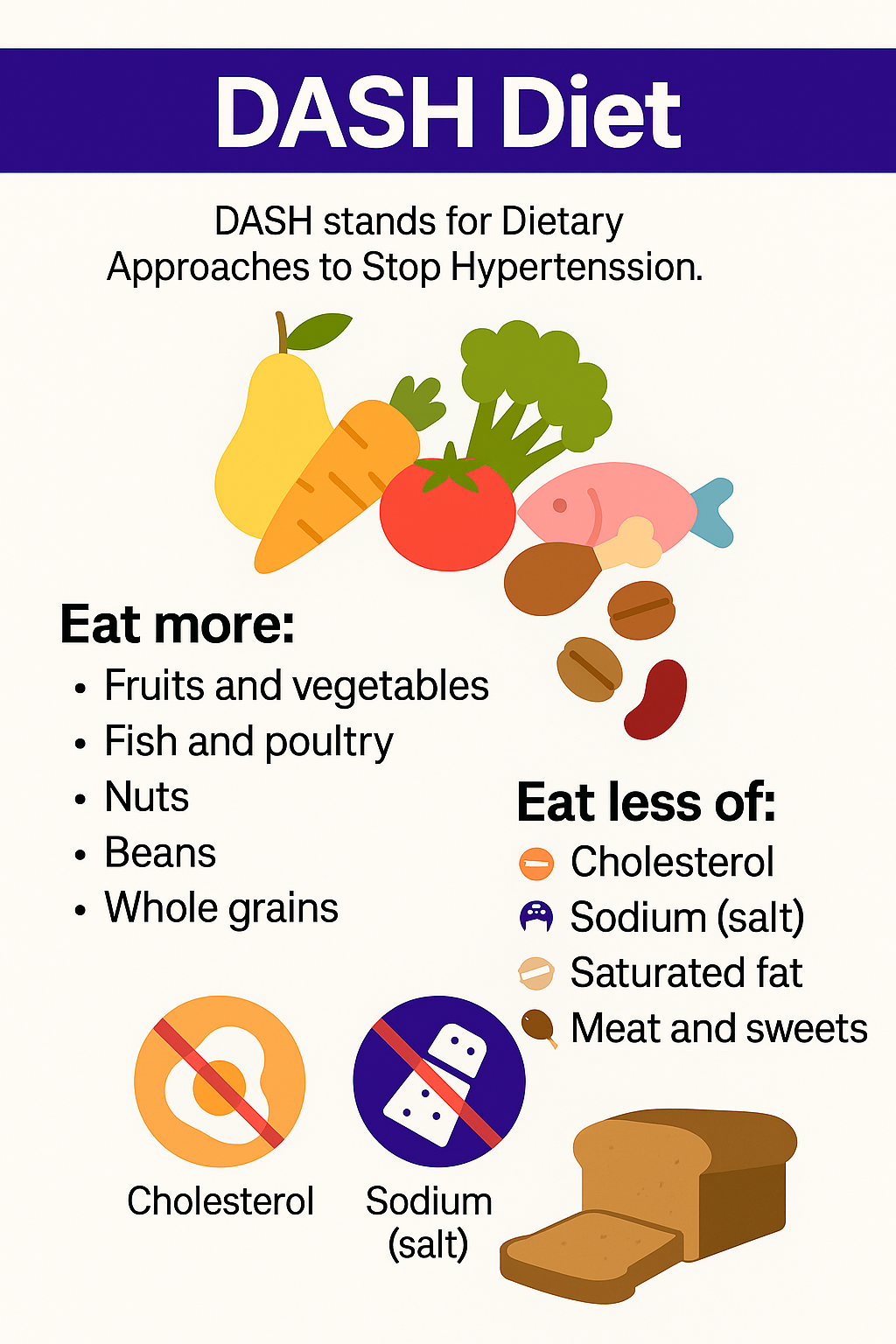
When you eat a healthy diet with plenty of whole, unprocessed foods you consume a wide range of nutrients that are linked to elongated telomeres. They lower your chances of shorter telomere length and their negative consequences.
Many of the key nutrients in these foods are classified as polyphenols -- plant compounds that act as antioxidants and which can put the kibosh on inflammation. A systematic review of research on polyphenols conducted in Italy shows that eating plenty of plant foods rich in polyphenols is associated with longer telomere length and packs a powerful punch in furthering healthy aging.6
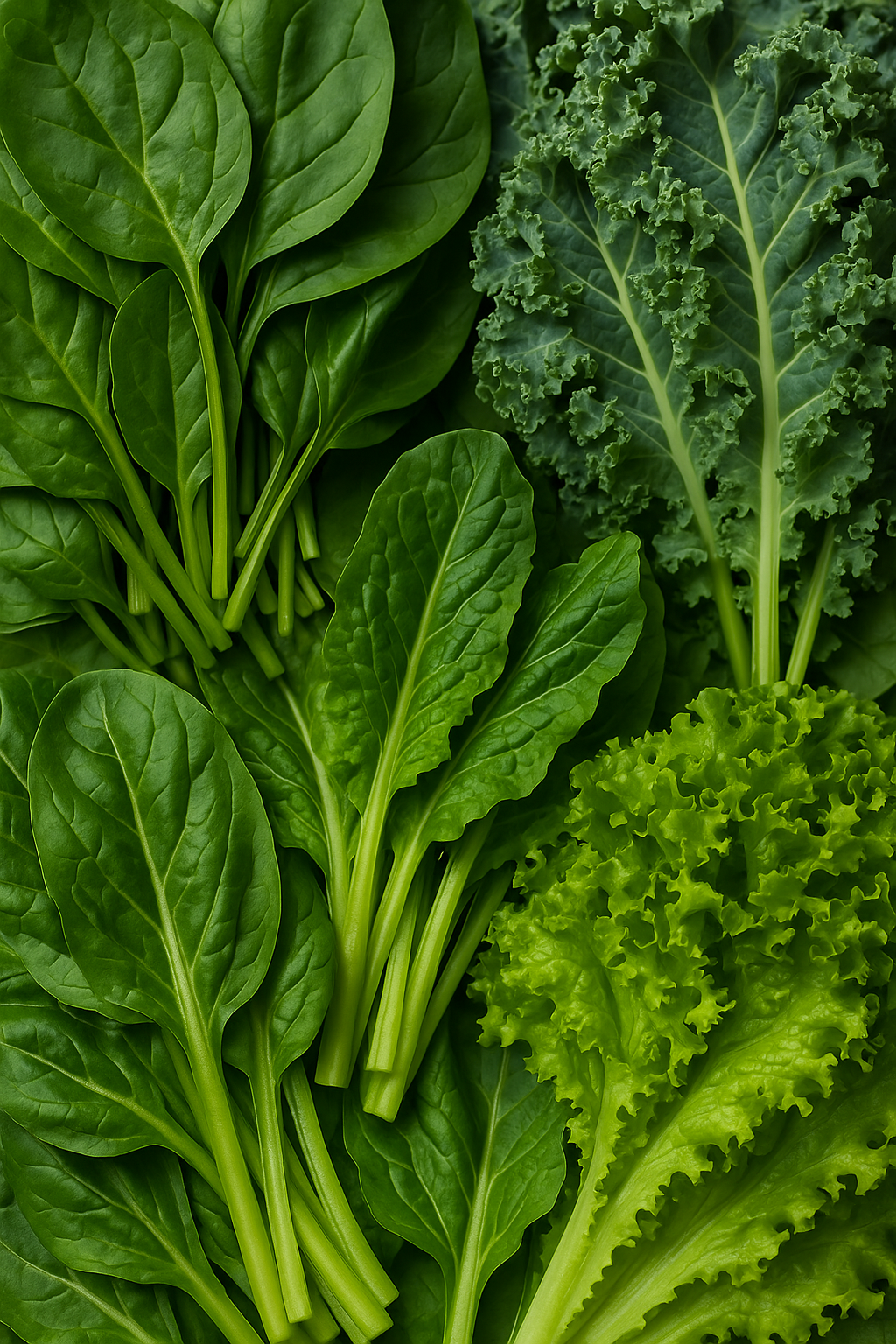
Top 10 Telomere-Boosting, Inflammaging-Fighting Foods
Green leafy vegetables like spinach, kale, cabbage, lettuce, turnip greens, arugula, and chard contain a cornucopia of nutrients that can improve your aging and protect telomeres. These encompass beta carotene, vitamins C and D, several of the B vitamins, as well as different versions of vitamin E. A review study in Spain indicates that green leafy vegetables may be especially valuable for telomere length at younger ages.11
Blueberries contain polyphenols and anthocyanins (pigments) that help protect telomeres and can support better DNA synthesis. Research in Asia demonstrates that blueberries' ability to promote shorter telomeres intertwines with their antioxidant, anti-inflammatory, and anti-aging effects.12 These nutrients also have a positive effect on lowering the risk of heart problems.
Walnuts are a rich source of healthy fats (including the vegetarian version of omega-3 fat) as well as soluble and insoluble fiber, vitamins B6 and E, folate, and a variety of minerals, including magnesium. An Australian study suggests that seniors who consume walnuts tend to have better telomere health, as well as increased strength and improved brain function. Eating walnuts at meals can have added benefits. The Aussie researchers believe that there are synergistic benefits that walnuts produce in conjunction with other healthy foods.13
Green tea contains antioxidants that are believed to help preserve telomere length. In particular, one of them, a natural chemical known as epigallocatechin gallate (EGCG), is a potent anti-inflammatory that may help increase telomere length. A 6-year study in Korea found that drinking green tea daily improves your chances of avoiding shortened telomeres. 14
Tomatoes contain a significant number of antioxidants. The one that has attracted the most attention is lycopene, the pigment that gives tomatoes (and foods like watermelon and pink grapefruit) their color. An international study found that folks with the highest blood levels of lycopene have white blood cells with longer telomere length.15 If you want to maximize your intake of lycopene from tomatoes, you can absorb the nutrient more effectively from cooked tomatoes -- in tomato sauce -- than from raw tomatoes.
Turmeric, which contains the bioactive compound curcumin, is a spice that has long been regarded as anti-inflammatory. Research has confirmed that one of its chief benefits is the fact that its curcumin can lengthen telomeres by revving up telomerase activity.16 It's easy to consume turmeric by adding some to your food. But curcumin is also available as a supplement.
Fermented foods, such as kimchi, yogurt, and sauerkraut, may help lengthen telomeres by providing probiotic bacteria and enhancing gut health. These types of actions decrease inflammation in your digestive tract -- which in turn has been shown to improve telomere length. Research in France on animals has demonstrated that consuming fermented foods is associated with longer telomeres.17 In the French study, these foods increased lifespan by an average of 40%.
Avocados, according to researchers in Italy, are "rich in healthy fats, vitamins, and antioxidants, which help reduce oxidative stress and inflammation, protecting telomeres." 18 Avocados are ideal for adding to main courses and desserts.
Dark chocolate contains resveratrol, a polyphenol that is linked to longer telomeres. A study in England suggests that resveratrol and related compounds can help protect telomeres in older cells, allowing DNA to behave more like younger DNA during cell division.19 If you want to eat dark chocolate to get the most benefit, limit how much you eat daily and make sure it doesn't contain vast amounts of sugar.
Fatty fish like salmon and sardines are rich in omega-3 fatty acids that are associated with longer telomeres. A lab test at Harvard shows that consuming fish and incorporating omega-3s into your diet can help your telomeres remain intact and may help cells avoid harmful senescence. 20
Foods to Avoid: The Inflammaging Accelerators
In your efforts to help your telomeres stay longer, experts recommend limiting ultra-processed foods, reducing refined sugar intake (Keep that sweet tooth under control!), and avoiding trans fats.
A growing number of studies show that individuals who consume the highest amounts of processed foods typically have the shortest telomeres. For example, a study in Spain of approximately 1,000 people over the age of 55 found that those who consumed three or more servings of processed foods had shorter telomeres than individuals who consumed fewer of these items. In their findings, the Spanish researchers found that, along with shortened telomeres, the processed food consumers also had higher risks of depression, high blood pressure, and obesity, along with a greater chance of dying during the research. 21
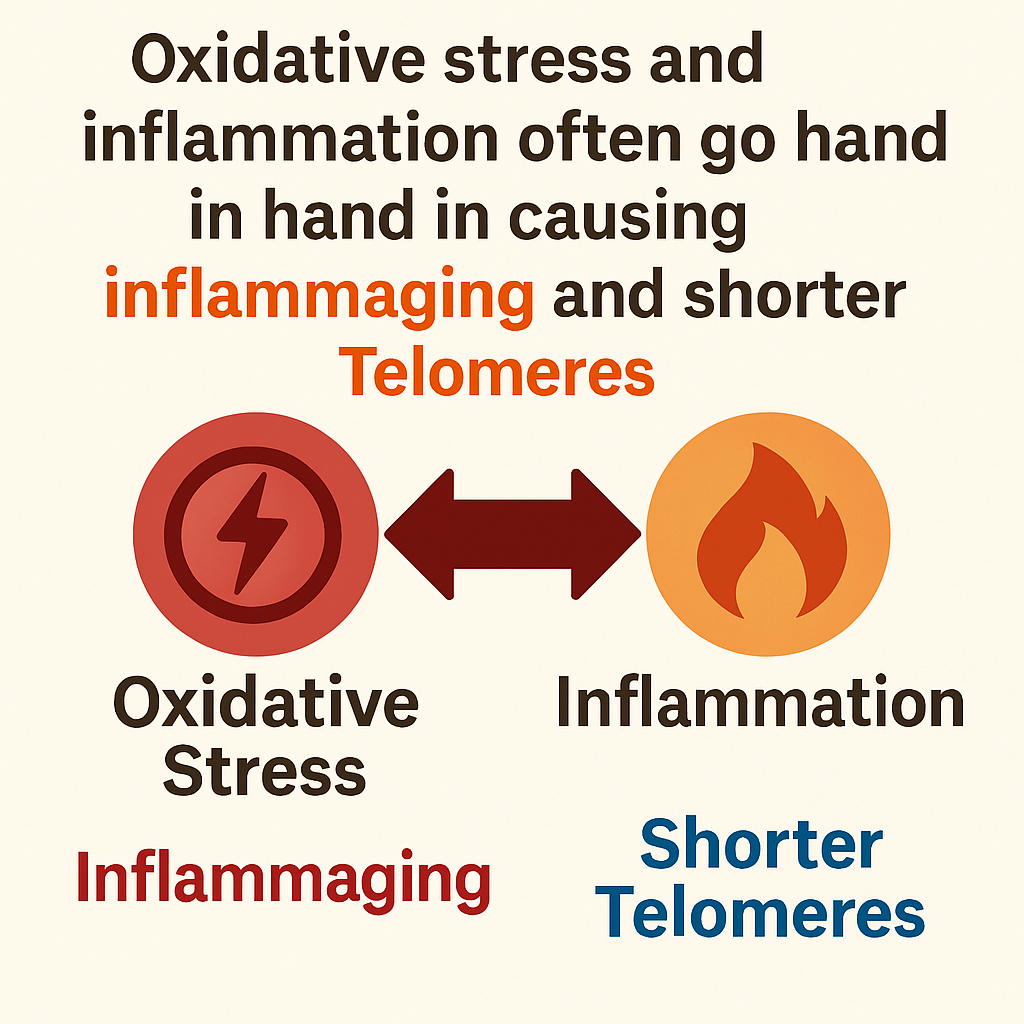
The Spanish scientists add that the mechanism by which processed foods shorten telomeres stems from the fact that they increase oxidative stress and promote harmful inflammation. In particular, consuming large amounts of sugar and the trans fatty acids found in many processed foods accelerates telomere shortening for the same reasons.
Supplementing For Better Telomere Health
Omega-3 fats: These fatty acids, found in fish and nuts, can help prevent telomere shortening and produce other benefits in slowing the biological aging process. European scientists reviewing the research on omega-3s conclude that an "overwhelming" number of studies show these fatty acids are beneficial for keeping telomeres longer.6 You can get omega-3 by eating fatty fish like sardines or salmon at least three times a week. They're also available in fish oil supplements.
Vitamin D: Several studies have shown that vitamin D can be effective at supporting telomere health. A four-year test involving more than 1,000 people in their 50s and older who took 2,000 IU of vitamin D daily for five years found that the vitamin D takers (compared to a control group who didn't receive the nutrient) had increased leukocyte telomere length. (Leukocytes are white blood cells.)7
Magnesium: When it comes to steering telomeres into greater length and improving telomere function, magnesium serves as a co-pilot to telomerase. According to researchers in the UK, magnesium multitasks by riding herd over telomere structure, integrity, and function and activating telomerase. 8 In their published research, the scientists point out that the roles magnesium plays to prevent telomere shortening and support better cellular aging are complex. Magnesium can be taken in supplements, and it's also found in dark chocolate, legumes (such as beans), chia, pumpkin, flax seeds, and avocados.
Vitamin C: Although not a lot of research has examined how vitamin C interacts with telomere shortening, researchers in Asia have found that this potent antioxidant, which can help hold oxidative stress and inflammation in check, prevents oxidative damage and lowers the risk of shortened telomeres. The Asian review study demonstrated that, after accounting for other lifestyle factors, consuming specific foods rich in vitamin C (as well as vitamin C supplements) is associated with longer telomere length. 9 Foods high in vitamin C include citrus fruit, kiwi fruit, bell peppers, broccoli, and cantaloupe.
Astragalosides: These phytochemicals, found in astragalus, can keep telomeres longer and increase the beneficial activities of telomerase. A study in France, for example, shows that taking astragalus reduces the number of shortened telomeres in just six months.10
Green Valley Naturals Genesis Can Help
Genesis by Green Valley Naturals is designed to complement a healthy lifestyle by supplying key nutrients that support telomerase activity and telomere protection. It contains powerful antioxidants which are shown in studies to maintain telomere structure and function, especially when paired with a healthy lifestyle. Genesis is the science-backed support your body needs for healthy aging and DNA protection.
Your Lifestyle Matters
Other daily lifestyle habits can make a big difference in helping you maintain longer telomeres.
One of the most powerful tools you can use is physical activity. You probably already know that getting regular daily exercise is linked to reducing the risk of heart disease, decreasing the likelihood of developing diabetes, improving stress management, reducing depression, promoting better sleep, and aiding in weight control.22 But exercise can also reduce inflammation and help you maintain longer telomeres. A systematic review in Asia that analyzed eleven studies involving almost 20,000 people concludes that exercise "regardless of the intensity of the exercise" makes telomere length longer. 23 That's great news! Even if you're just taking a daily walk, you're supporting longer telomeres and healthier aging.
It is also essential to manage your stress effectively. You can use exercise, meditation, or some other stress-control method to improve your stress management. Otherwise, chronic stress can lead to shortened telomeres. 24
Summary
Telomeres are protective caps at the ends of DNA strands that play a crucial role in aging and disease prevention. Their length is a marker of cellular health, and shortening is associated with age-related diseases like cancer, heart disease, and cognitive decline. This article explores how diet—specifically nutrient-dense, anti-inflammatory foods—can help preserve telomere length. Foods like leafy greens, blueberries, walnuts, turmeric, and fatty fish are shown to activate telomerase, the enzyme that extends telomeres. On the other hand, ultra-processed foods, sugar, and trans fats accelerate telomere erosion through a process known as inflammaging. The article also highlights supportive nutrients like vitamin D, magnesium, and omega-3s, and outlines lifestyle tips like exercise, stress management, and fasting to further protect telomere health and promote longevity.
Frequently Asked Questions
What lengthens telomeres most?
If you're looking for strategies to get your telomeres to the best length, researchers in Belgium recommend you get out and exercise everyday and eat a healthy plant-based diet that follows the rules of the Mediterranean diet. They report that the current research supports those as the way to go although they feel that future research may turn up new ways to stretch telomeres.25
What speeds up telomere shortening?
The way many people live today contains many lifestyle choices that accelerate telomere shortening and clip them down to unhealthy lengths. Sitting for most of the day on the couch or at a desk staring at a video screen can trim telomeres to an unhealthy short size. Plus, the ultra-processed foods that folks dine on daily have been shown to almost guarantee your telomeres will be too short to keep you healthy.
Does fasting increase telomere length?
Cutting calories, fasting and intermittent fasting (such as time-restricted eating) has been shown to lengthen telomeres. Plus, studies suggest that if you slip some exercise into the times you're fasting, you may improve your telomeres even more.26
Does coffee lengthen telomeres?
Drinking a modest amount of coffee may help you have longer telomeres. But don't overdo it. Because if you consume a lot of caffeine (from coffee, energy drinks and soft drinks), that caffeine is associated with shorter telomere length. So if you drink coffee, you should probably stick to one or two cups a day. Or indulge in decaf. 27
-
"Vitamin D supplements may slow biological aging," Mass General Brigham, May 22, 2025
-
“Exercise: 7 benefits of regular physical activity,” Mayo Clinic, viewed July 1, 2025
-
Lin X, et al. "Effect of Different Levels of Exercise on Telomere Length," J Rehabil Med 2019;51(7)
-
Tucker CA. "Caffeine consumption and telomere length in men and women," Nutr Metab (Lond) 2017;14:10
